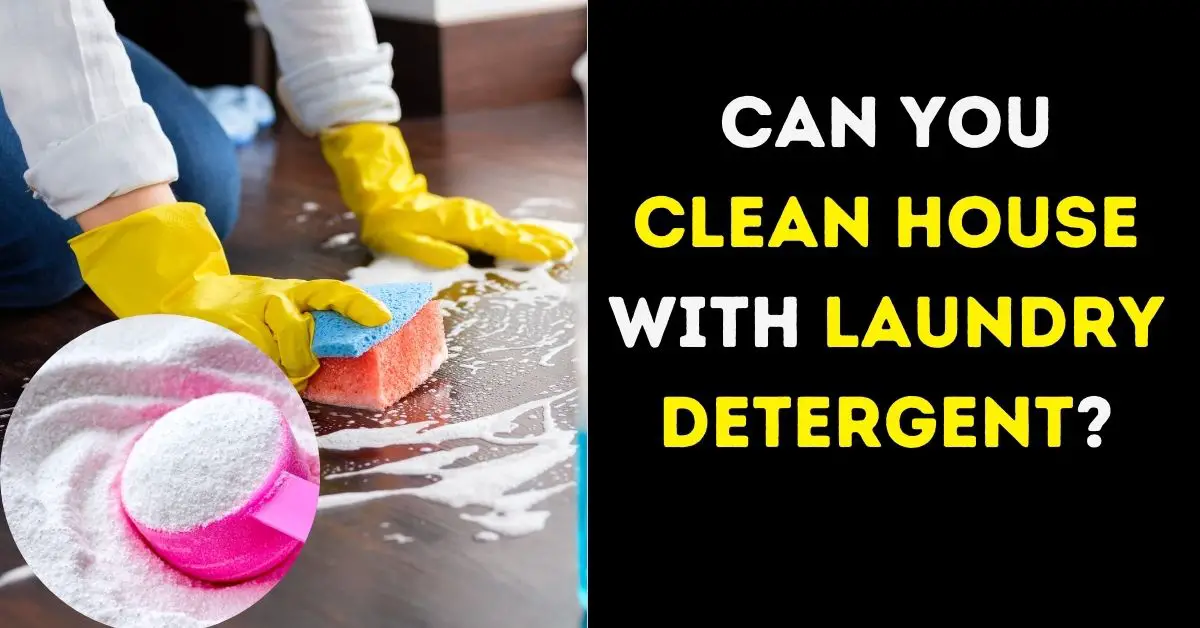
In our quest for cleanliness, we often find ourselves surrounded by many cleaning products – each promising to do a specific job better than the rest.
From kitchen cleaners to bathroom scrubbers, floor polishers to window shiners, the cleaning section in the supermarket is truly a maze of options.
But what if we told you that one common household item, often overlooked in the context of overall house cleaning, can be a versatile and potent cleaning agent? Yes, we’re talking about your everyday laundry detergent.
Yes, you can clean your house with laundry detergent. It’s cleaning properties that work effectively on clothes can also be useful for various household cleaning tasks. The properties that make it effective at removing stains and dirt from our clothing can also come in handy for a broad range of house cleaning tasks.
4 Reasons Why You Should Consider Laundry Detergent for Cleaning

Here are a few reasons to consider using laundry detergent for other cleaning tasks:
1. Multi-Use Cleaner
Rather than buying and storing multiple cleaning products for different tasks, you could use one product – laundry detergent – for a variety of cleaning chores. This could simplify your shopping list and reduce clutter in your cleaning cupboard.
2. Cost-Effective
Laundry detergent is often cheaper per unit volume than many specialized cleaning products. Using it for various cleaning tasks could lead to substantial savings over time.
3. Easy Availability
Laundry detergent is a staple in most households and is readily available in stores. Unlike more specialized cleaning products, this means you’re less likely to run out of it.
4. Environmentally Friendly
Using one product for multiple purposes reduces packaging waste from multiple cleaning products. This helps cut down on plastic waste and is a step toward more sustainable living.
How to Use Laundry Detergent for Cleaning
Here’s a simple guide on how you can leverage the cleaning power of your laundry detergent:
1. Mix The Solution
The first step is to dilute the laundry detergent with water. The ratio will depend on what you’re cleaning. A general rule of thumb is to use one teaspoon of detergent for every cup of water. However, for tougher stains or dirt, you may need to increase the amount of detergent.
2. Apply The Solution
Apply the mixture to the surface you’re cleaning. You can use a cloth or a sponge to scrub the area gently. Avoid applying the mixture directly to surfaces without testing it first, especially on colored or delicate materials.
3. Rinse
After scrubbing the area, followed by rinsing it thoroughly with water. It’s important to remove all the detergent to avoid any residue or potential damage to the surface.
4. Dry
After rinsing, dry the surface thoroughly to prevent water spots or streaks. Use a clean, dry cloth to wipe the surface dry.
6 Areas You Can Clean Using Laundry Detergent In Your Home
There are plenty of places where laundry detergent can do a fantastic job. Here are some areas where you can use laundry detergent for cleaning:
1. Floors
Laundry detergent can be used to clean tile and linoleum floors. Just make sure to rinse thoroughly to avoid any soapy residue.
2. Carpets
Laundry detergent can help lift stains from carpets. Apply a small amount of diluted detergent to the stain, gently scrub with a brush, then rinse with warm water.
3. Kitchen and Bathroom Surfaces
Detergent can clean countertops, sinks, and other hard surfaces in your kitchen and bathroom. However, avoid using it on natural stone surfaces like granite or marble.
4. Outdoor Furniture
Plastic or metal outdoor furniture can be cleaned with a mixture of laundry detergent and warm water.
5. Garage Floors
Tough oil and grease stains on concrete garage floors can be removed using laundry detergent.
6. Trash Bins
Laundry detergent is effective in removing odors and stains from indoor and outdoor trash bins.
6 Safety Precautions When Using Laundry Detergent for Cleaning
It’s important to keep in mind certain precautions to ensure safe and efficient use:
1. Always Dilute
Laundry detergent is highly concentrated, and using it undiluted can damage surfaces or leave a sticky residue. Make sure you dilute with water before using.
2. Avoid Certain Surfaces
Some materials, such as natural stone (like marble and granite), hardwood, and certain metals, may react adversely to laundry detergent. Always do a patch test on an inconspicuous area before applying it to the entire surface.
3. Avoid Food Items
Laundry detergent is not designed for cleaning dishes, utensils, or any other items that come into direct contact with food. It can leave a residue that, if ingested, can cause illness.
4. Rinse Thoroughly
After using laundry detergent, it’s crucial to rinse the surface thoroughly to prevent any potential build-up or residue.
5. Use Gloves
Although not typically harsh, some laundry detergents can irritate the skin, especially with prolonged exposure. It’s a good idea to wear gloves while cleaning with laundry detergent.
6. Keeping Out of Children and Pets
As with any cleaning product, keep laundry detergent out of reach of children and pets to prevent accidental ingestion or skin exposure.
FAQs
Can I use laundry detergent as an all-purpose cleaner?
Can you use Tide to clean your house?
Is it safe to mop with laundry detergent?
What is the most hygienic way to clean floors?
Final Words
As we’ve discovered, laundry detergent is much more than a simple agent for cleaning clothes. Its potent cleaning properties make it a versatile addition to our home cleaning arsenal.
Using it correctly can serve as a cost-effective, multi-purpose, and readily available cleaning solution for various areas of your house.
The goal of a cleaner home doesn’t necessarily mean more cleaning products. Sometimes, one versatile agent, like laundry detergent, can do the job.
